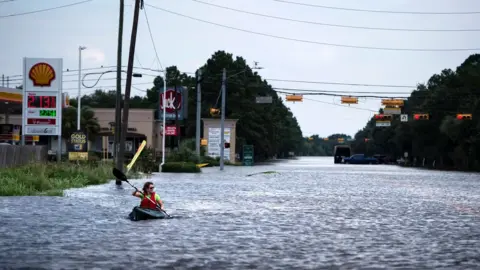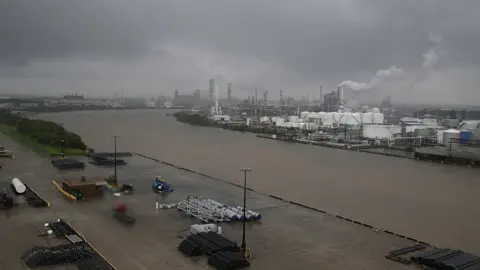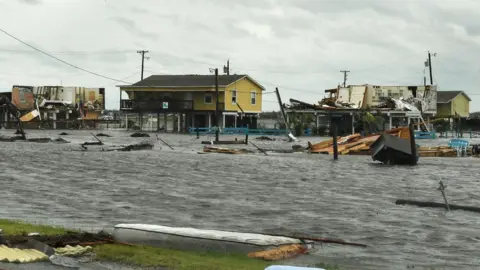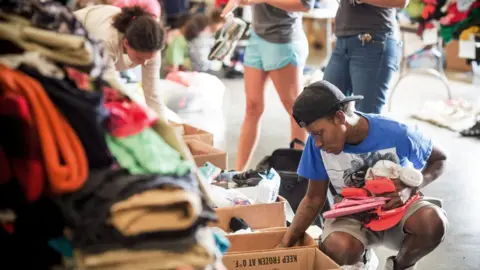How hard has Hurricane Harvey hit the local economy?
 AFP/Getty
AFP/GettyThe costs of the deadly storm in Texas and the Gulf of Mexico have continued to mount, with Texas authorities estimating it at $125bn (£97bn).
Hurricane Harvey has killed more than 30 people and destroyed thousands of homes.
While the rain has shifted away from Houston, the US's fourth largest city, much remains underwater. The state of Texas is one of the US's main economic engines.
Many firms in the region, a major transport hub that is a home to the oil and gas industry, don't know when they will resume normal operations.
Oil and gas
The storm struck at the heart of America's oil and gas industry, knocking a third of all US production offline, closing refineries around the Gulf Coast, and causing major pipelines that move fuel to other markets to shut.
Petrol prices, which increased in anticipation of the storm, are expected to continue to rise, despite additional shipments from overseas. In Texas, shortages at stations in some areas have been reported.
Mansfield Oil Company, a wholesale gas supplier, is trying to bolster its supplies by bringing in fuel by lorry and rail - even ships, depending on the market.
 AFP/Getty
AFP/GettyCompanies are trying to figure out when they can restart operations.
Colonial Pipeline said it expected to re-open its Houston line by Sunday, but other firms said they didn't know when normal operations would resume.
"Given the unprecedented flooding in the city of Port Arthur, it remains uncertain how quickly the flood waters will recede, so we cannot provide a timeline for restart at this time," said Motiva, which runs one of the biggest refineries. "Our priority remains the safety of our employees and community."
Industry damage
Moody's expects costs to businesses to total $10bn-$15bn, with additional infrastructure costs rising as high as $10bn.
Some damage was already evident.
Fires from organic peroxides were reported at the Crosby plant of chemical company Arkema and more were expected, after flooding overwhelmed the firm's back-up generators and refrigerators designed to keep the materials cool.
The plant was six feet underwater, the company said.
 AFP/Getty
AFP/GettyShutdowns of other facilities have led to releases of pollutants, while water has overwhelmed Houston's sewers. The structural integrity of reservoirs is also being monitored, the White House said.
Transport networks
Partial service has resumed at Houston airports and the port is expected to open for limited business on Friday, but parts of the Houston Ship Channel, which provides access to refineries, remain off-limits.
Other transit networks may take longer to recover as roads and other land remains submerged.
Railroad BNSF, for example, has suspended trains that would have travelled through the region and warned they would not resume for "an extended period".
"I don't even want to speculate," BNSF spokesman Joe Faust said.
Households count cost
The majority of the damage has been felt by families, who are likely to be grappling with the financial hit without insurance.
More than 350,000 people have registered for assistance from the federal government, said the Federal Emergency Management Agency (FEMA).
More than 37,000 people had also filed claims with the National Flood Insurance Program by mid-Thursday.
Analysts say they expect that number to rise to about 500,000.
 AFP/Getty
AFP/GettyBut many of the losses will not be covered, which is likely to make it harder for families - and the economy - to bounce back, analysts said.
"A lack of flood insurance for homeowners will prevent the type of full-scale reconstruction effort that might otherwise be expected," Moody' s wrote. "This could have significant long-term ramifications."
Wider effects
The Houston region is responsible for more than $500bn in economic activity annually.
AccuWeather expects the storm to shave a full percentage point off US GDP over 12 months and lead the Federal Reserve to hold off on raising interest rates.
Macroeconomic Advisers is forecasting that lower production as a result of the storm could reduce third quarter GDP by 0.3%-1.2%, depending on how long the recovery takes.
But senior economist Ben Herzon says money spent on reconstruction should help boost the figures in later months.
He's hopeful that the impact will be at the smaller end of the scale.
"I think the economy tends to be very robust and maybe even more robust than is sometimes expected," he said.
